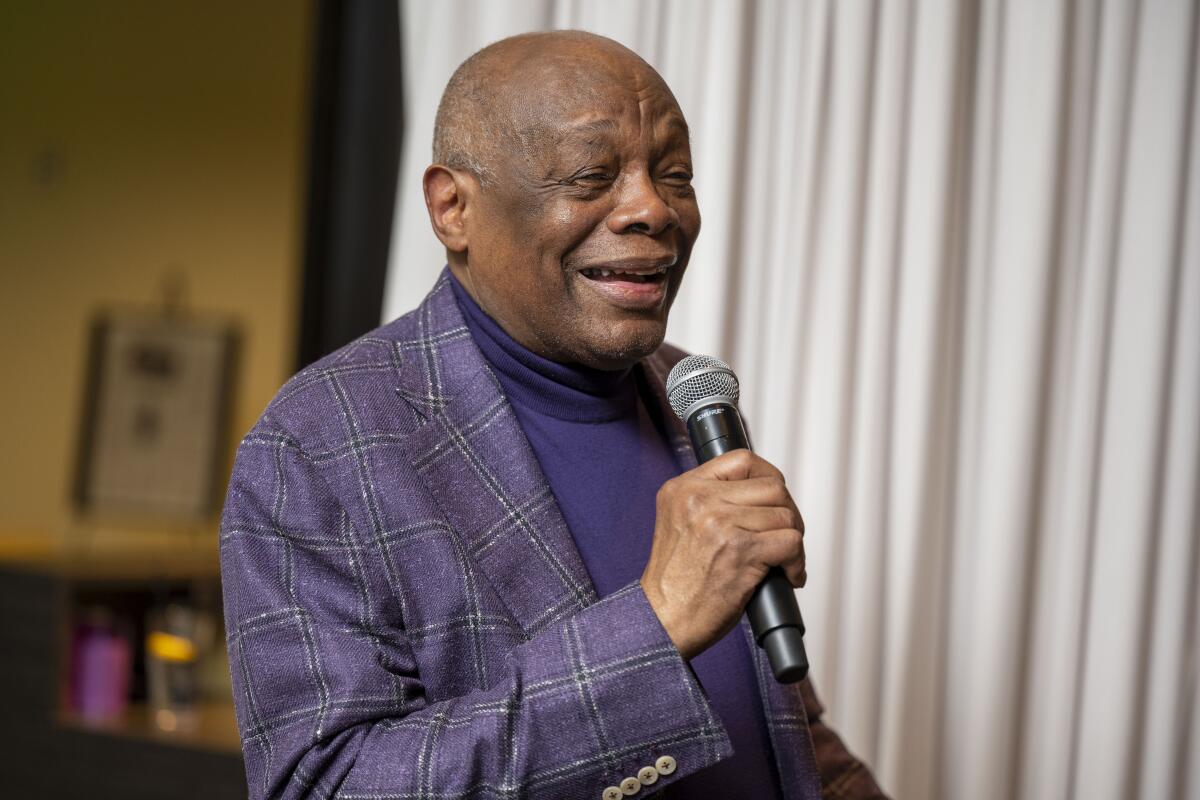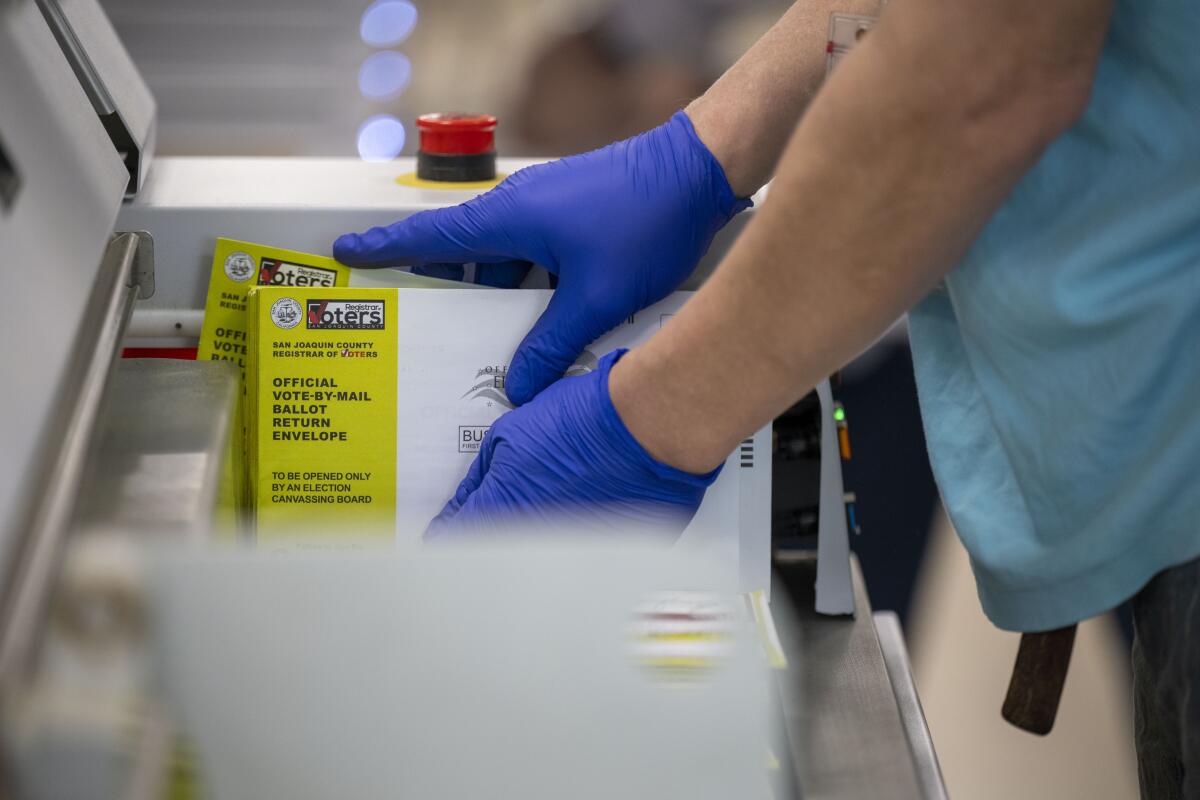How to close California’s budget deficit? Democrats plan to have a plan

- Share via
The three most powerful Democrats at the state Capitol came out Wednesday with a strange announcement. It boiled down to this: They’re working on a plan to address the state’s massive budget deficit by making some spending decisions this spring, long before the June deadline to pass a budget.
But they didn’t say how much their plan will close the deficit — just that it will be in the range of $12 billion to $18 billion — or specify what cuts they’ll make.
The announcement was odd because it really just affirmed the obvious — staring at a deficit of at least $38 billion, Gov. Gavin Newsom and legislative leaders have been haggling over taking “early action” for weeks — while leaving out the most crucial details. Normally when the governor and both legislative leaders put out a joint statement on the budget it’s because they’ve reached a substantive agreement, so this announcement was more noteworthy for what it didn’t say than what it did.
The “plan to have a plan,” as my colleague Taryn Luna described it, illustrates the challenges that lie ahead as Newsom, Assembly Speaker Robert Rivas (D-Hollister) and Senate leader Mike McGuire (D-Healdsburg) address what may be the largest budget deficit in state history. This first phase was supposed to be the easy part, making a few budget adjustments that are relatively painless compared with the deeper cuts that may be coming this summer.
Read more in Luna’s insightful article: Newsom and Democrats announce a plan to reduce the enormous budget deficit. How? TBD
I’m Laurel Rosenhall, The Times’ Sacramento bureau chief. Before I get into the rest of the week’s news, a quick programming update:
Together with my colleagues across the L.A. Times newsroom, we’ve been working on some exciting plans to update our politics newsletters for this election year. Today’s edition of California Politics is the last one by me. We’ll be taking a week off and coming back to your inbox in April with a new look and a new writer. I promise you it will be fabulous.
Now here’s what else is going on in Golden State politics this week:
You are reading our Politics newsletter
Sign up to get an inside guide to the movers, shakers and lawmakers who shape the Golden State.
You may occasionally receive promotional content from the Los Angeles Times.
Willie Brown at 90: Still a political visionary

Columnist George Skelton caught up this week with Willie Brown, a legend in California politics who made history as the first Black Assembly speaker and the first Black mayor of San Francisco. Brown turned 90 on Wednesday.
Skelton reminisces about the first time he saw Brown in the state Capitol, and remembers exactly what he was wearing — a Nehru jacket that showed a streak of counterculture rebellion and, Skelton writes, “a sign of self-confidence and independence.”
“Brown didn’t enter those large mahogany Assembly doors in 1965 just to fit in. He eventually did, but more than that he led, becoming one of the most important political leaders in California history,” Skelton writes.
This is a great column that encapsulates Brown’s incredible rise from a childhood working in a barbershop in segregated Texas to the heights of power in California. It’s full of anecdotes from history that show Brown’s political mind in action — how he gained power by making enemies into friends.
Give it a read: Even at 90 and with deteriorating eyesight, Willie Brown’s political vision remains unmatched.
Voter fraud, real and suspected

It didn’t make huge news when it happened earlier this year, but former Lodi City Council member Shakir Khan pleaded “no contest” in January to felony charges, including election fraud, after the San Joaquin County Sheriff’s Office said it found 41 sealed, completed ballots in his home and about 70 people registered to vote using his address, phone number or email.
The alleged scheme stems from Khan’s run for City Council in 2020, explains Times reporter Mackenzie Mays. And while there’s no evidence it was related to any broader voter-fraud plot — the local sheriff said it had “no impact on any state or federal elections that we know of” — the case has become fuel in the broader paranoia about election security.
It’s drawn the attention of national conservative commentators, supercharged a group of local right-wing activists, sowed voter distrust in an already chaotic political environment and pushed the county to spend thousands of dollars on election security measures such as new ballot boxes and cameras to monitor them. Mays tagged along with some local activists concerned about election security on Super Tuesday and delivered this fascinating tale:
A Central Valley politician was charged with voter fraud. Right-wing conspiracies took over
Enjoying this newsletter? Consider subscribing to the Los Angeles Times
Your support helps us deliver the news that matters most. Become a subscriber.
Keeping up with California politics
Voters approve Proposition 1, Newsom’s overhaul of the California mental health system
The close contest over Gov. Gavin Newsom’s $6.4-billion bond measure to transform California’s mental health system finally ended Wednesday, more than two weeks after the primary election. Though election officials have until April 12 to officially certify the results, Proposition 1 led with 50.2% of the vote when the race was called with more than 7.5 million ballots counted statewide.
Border security could sway some California Democrats — and control of Congress
Thirty-seven Democrats voted earlier this month for the Laken Riley Act, which would require the Homeland Security Department to detain immigrants who are arrested on suspicion of theft-related crimes. A week later, 14 Democrats voted for a resolution “denouncing the Biden administration’s open-borders policies.” The votes could reflect how Democrats in vulnerable congressional seats might stave off attacks from opponents who say they’re soft on the issues of immigration and the border.
Two Republicans will face off to replace Kevin McCarthy in California’s Central Valley
Central Valley voters have selected two Republicans to face off in May to represent the San Joaquin Valley in Congress for the remainder of former Rep. Kevin McCarthy’s term. McCarthy’s handpicked successor, Assemblymember Vince Fong, will advance to the runoff election in May. With most ballots counted, Tulare County Sheriff Mike Boudreaux, a law-and-order conservative, said that he expected to advance as well.
Rep. Katie Porter says she regrets calling the California Senate primary ‘rigged’
The outspoken Rep. Katie Porter is cleaning up after a controversial comment she made in the aftermath of her California Senate primary loss to fellow Democrat Rep. Adam B. Schiff and Republican Steve Garvey.
Column: More than 30 states have elected female governors. Will California finally join them?
In 173 years as a state, California has had 40 governors. Democrats, Republicans, members of the Unionist and Know-Nothing parties. Merchants, lawyers, former mayors. A bodybuilder-turned-movie-star. Two movie stars, actually. But never a woman. It’s a fact that stands out like Half Dome, writes columnist Mark Z. Barabak.
Column: I know who Trump should pick for vice president — and she’s right here in O.C.
Columnist Gustavo Arellano writes that the person Trump should pick for his ticket “is on no one’s radar except mine” and makes the case for Huntington Beach Mayor Gracey Van Der Mark.
Stay in touch
Did someone forward you this? Sign up here to get California Politics in your inbox.
Until next time, send your comments, suggestions and news tips to capolitics@latimes.com.
Sign up for Essential California
The most important California stories and recommendations in your inbox every morning.
You may occasionally receive promotional content from the Los Angeles Times.




